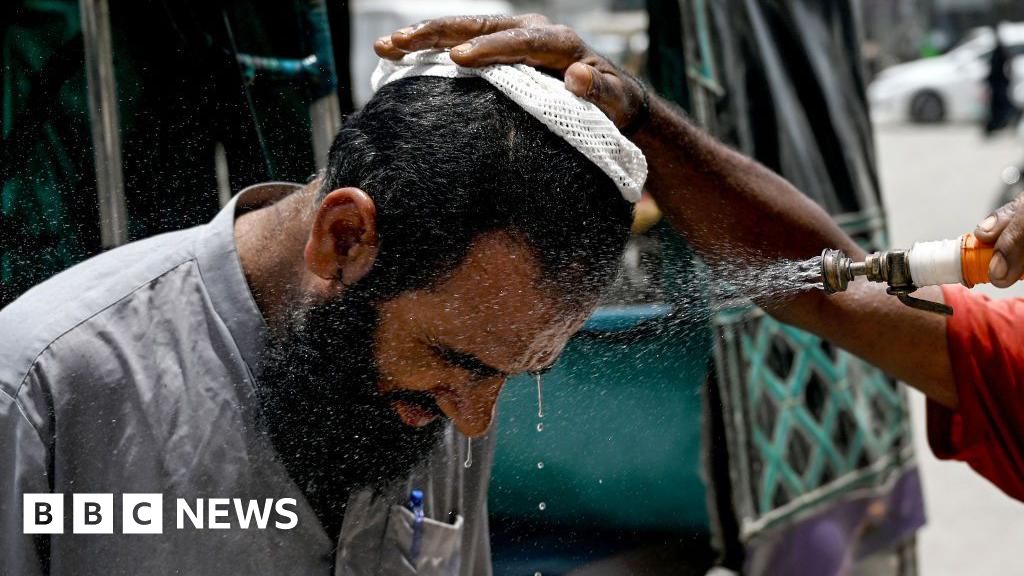Pakistan: More than 500 dead in six days due to heat wave

Image source, Getty Images
- Author, Caroline Davis
- Role, Pakistan correspondent
As temperatures rose in southern Pakistan, the death toll also rose.
Edhi Ambulance Service says it normally brings about 30 to 40 people to the Karachi city morgue every day.
But in the last six days, around 568 bodies were collected – 141 of them on Tuesday alone.
It is still too early to determine the exact cause of death in any case.
However, the death toll also rose as temperatures in Karachi rose above 40 degrees Celsius and it felt as hot as 49 degrees due to high humidity, reports said.
People went to hospitals to seek help.
Civil Hospital Karachi admitted 267 people with heat stroke between Sunday and Wednesday, said Dr. Imran Sarwar Sheikh, head of the emergency department. Twelve of them died.
“Most of the people we saw in the hospital were in their 60s or 70s, although there were some in their 45s and even a few in their 20s,” Dr Sheikh told the BBC.
Symptoms include vomiting, diarrhea and high fever.
“Many of those we saw had been working outside. We told them to drink plenty of water and wear light clothing in these high temperatures.”
The high temperatures – described by one meteorologist as a “partial heat wave” – began at the weekend.
To provide relief to the population, heat centers and camps were set up.
The pictures show children playing in fountains and trying to cool off.
“Look at me! My clothes are soaked with sweat,” Mohammad Imran told Reuters as he struggled to keep his cool on Monday.
Not everyone who needed help made it to the hospital.
When Wasim Ahmed returned home, he knew he was not well.
The 56-year-old security guard had just finished a twelve-hour night shift outdoors. Even then, the temperatures had become too much for him.
“He came through the door and said I can’t handle this hot weather,” Adnan Zafar, Wasim’s cousin, told the BBC. “He asked for a glass of water. Shortly after he finished drinking it, he collapsed.”
When Wasim’s family took him to the hospital, doctors said he had probably already died of a heart attack.
Adnan says he has a heart condition, but the heat has never harmed him.
Some fear that Karachi’s struggle with high temperatures will be made worse by regular power outages, which in turn will cause the fans and air conditioners that many people rely on to keep cool to fail.
Muhammad Amin was among those who suffered from load shedding, a common practice used by power companies throughout Pakistan to maintain supplies.
His relative said there were constant power outages in his apartment.
According to his family, Muhammad, who was about 40 years old, suddenly became ill and died.
The cause of death has not yet been determined, but his family suspects heat illness.
According to the Dawn newspaper, rescue workers found nearly 30 dead people on the streets of the city.
Many of them are probably drug addicts, police doctor Summaiya Syed told the newspaper. However, they showed no signs of injuries.
Karachi is not the only part of Pakistan facing difficulties.
According to Reuters, a near-record temperature of 52.2 degrees Celsius was recorded last month in Sindh province, of which Karachi is the capital.
Pakistan’s neighboring countries have also suffered from extreme, deadly temperatures in recent weeks.
Across the Indian border, the capital Delhi is suffering an “unprecedented” heatwave; daytime temperatures have been above 40 degrees Celsius (104 degrees Fahrenheit) since May, with peaks of nearly 50 degrees Celsius.
The city’s doctors say they have never seen anything like this before.
For Mohammad Zeshan, who lives in Karachi, it is clear where the problem lies.
“It’s because of climate change,” he told Reuters. “It’s happening all over the world. It’s happening in Europe too. They’ve been exposed to a lot of heat, but they’ve taken action against it.”
“But here it is sad that the government has not taken effective action.”
Experts agree that such extreme weather events are becoming more frequent and severe due to climate change.
The heatwave hitting Karachi is expected to continue into next week, although slightly lower temperatures are forecast.
Weather experts are now turning their attention to the monsoon season, which is expected to arrive earlier and bring up to 60% more rain, according to experts who spoke to Dawn.



:max_bytes(150000):strip_icc():focal(421x562:423x564)/Post-Surgery-Marty-Kedian-with-Dr-David-Lott-071024-a28c1bf7342f42bbb518eb90d3ab6de4.jpg)